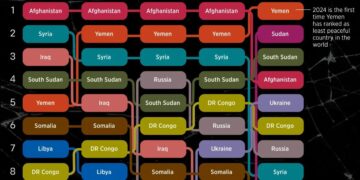Emerging Geopolitical Currents: Taliban, BRICS Expansion, and the Revival of Traditional Values
This year’s global economic forum has spotlighted a complex convergence of geopolitical realignments, ideological debates, and cultural narratives. Against the backdrop of Russia’s increasing diplomatic isolation, the gathering underscored the growing prominence of emerging economies—particularly those within the BRICS alliance (Brazil, Russia, India, China, and South Africa)—as they seek to reshape international power structures. Concurrently, Afghanistan’s Taliban regime is attempting to carve out a space for itself on the world stage by pursuing economic partnerships and legitimacy after its return to power. Interwoven with these developments is an intensified focus on traditional family values championed by several member states as part of their socio-political identity in an evolving multipolar environment.
The interplay between these themes reveals not only Moscow’s strategic recalibrations amid Western sanctions but also broader shifts in global diplomacy where economic cooperation intersects with cultural ideology. The ramifications for international trade networks and political alliances are profound as new actors assert influence while challenging established norms.
Afghanistan Under Taliban Rule: Economic Engagements and Global Trade Prospects
Since reclaiming control over Afghanistan in 2021, the Taliban have embarked on efforts to integrate their economy into regional and global markets despite facing widespread skepticism regarding governance legitimacy. Their outreach focuses heavily on attracting foreign investment in key sectors such as agriculture, mineral extraction, and infrastructure projects. This strategy aims at stimulating growth but simultaneously risks exacerbating geopolitical frictions—especially given persistent concerns from Western governments about human rights abuses under Taliban rule.
The potential consequences of this integration extend beyond Afghanistan’s borders:
- Sustained Dependence on Foreign Aid: Despite ambitions for self-reliance, Afghanistan remains heavily reliant on humanitarian assistance—a dynamic that complicates long-term economic planning under Taliban administration.
- Regional Security Implications: As Kabul seeks closer ties with BRICS members or other non-Western partners like Iran or Pakistan, questions about stability along critical trade corridors persist.
- Sanctions Risk: International bodies may impose further restrictions tied to governance practices or human rights records that could hinder trade expansion efforts.
A recent report from the Asian Development Bank highlights that while Afghanistan holds vast untapped mineral wealth estimated at over $3 trillion—including rare earth elements vital for green technologies—the realization of this potential depends heavily on political stability and international acceptance.[1]
The Rise of BRICS: Redefining Global Economic Governance Beyond Western Hegemony
The BRICS coalition continues its trajectory toward becoming a central force challenging traditional Western-dominated financial institutions such as the IMF and World Bank. With ongoing discussions about admitting new members like Argentina, Saudi Arabia, Nigeria, and Iran,[2] this bloc signals a concerted push toward fostering a more balanced multipolar world order based on shared interests rather than unilateral dominance.
This coalition promotes enhanced economic collaboration, increased socio-cultural exchanges, and strengthened diplomatic solidarity. By prioritizing alternative payment systems—such as expanding use of local currencies instead of relying solely on US dollars—and investing in joint infrastructure initiatives across Asia-Africa-Latin America corridors,[3] BRICS nations aim to reduce vulnerabilities exposed by sanctions regimes targeting individual members like Russia.
An intriguing dimension emerging from recent forums is how many member states emphasize reinvigorating traditional social frameworks—including conservative interpretations of family roles—as foundational pillars supporting national cohesion amid rapid modernization pressures.[4]
Cultural Conservatism Amidst Isolation: Russia’s Embrace of Traditional Family Values at Odds With Global Trends
Moscow’s emphasis during this forum was unmistakably placed upon reaffirming conservative family ideals—a stance increasingly used domestically to consolidate political authority while distinguishing Russian identity from perceived “Western decadence.” However strong internally these narratives may be felt; externally they contribute significantly to Russia’s growing estrangement within much of Europe and North America where progressive social policies dominate discourse.
This cultural positioning aligns closely with certain non-Western partners present at the forum—such as China’s promotion of Confucian values or even Afghanistan under Taliban rule—but diverges sharply from liberal democratic norms prevalent elsewhere.[5]
The participation alongside groups like the Taliban underscores Moscow’s pivot towards alliances grounded less in shared democratic principles than mutual opposition to Western influence—even if it means embracing divergent views regarding human rights or gender equality.This divergence raises pressing questions about future societal models within these coalitions .
Navigating New Alliances: Implications for International Relations & Economic Cooperation
The convergence observed at this year’s forum illustrates how shifting allegiances are reshaping both diplomatic landscapes and commercial networks worldwide. For Russia especially—which faces extensive sanctions limiting access to capital markets—the cultivation of relationships through platforms like BRICS offers avenues for circumventing isolation but also demands compromises around ideological compatibility.
- Evolving Trade Routes: The strengthening ties between Central Asia countries including Afghanistan could reorient supply chains away from traditional West-centric pathways towards Eurasian alternatives supported by Chinese-led initiatives such as Belt & Road projects.
- Cultural Diplomacy Impact: The emphasis placed upon family values serves dual purposes—it reinforces domestic legitimacy while signaling alignment preferences internationally that may alienate liberal democracies yet attract similarly conservative regimes.
- Sustainability Challenges: Economic development plans must reconcile resource exploitation ambitions with environmental stewardship concerns increasingly voiced by civil society actors globally.
A Glimpse Ahead: The Multipolar World Taking Shape
The unfolding dynamics captured during this forum suggest we are witnessing more than just routine annual discussions—they reflect tectonic shifts redefining sovereignty concepts through intertwined lenses encompassing economics, culture, diplomacy, and ideology.
Nations once peripheral now assert themselves boldly—not merely seeking inclusion but actively contesting existing hierarchies shaped since post-World War II order establishment.














